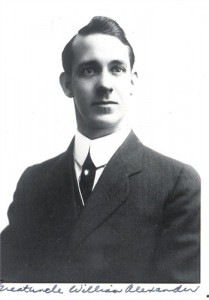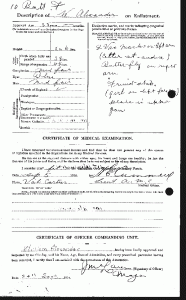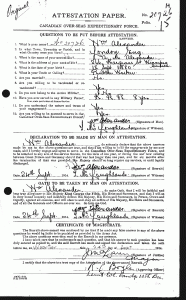Here’s to yet another bother blog post assigned by the most wonderful Ms Willemse herself. My attitude towards these assignments will slowly begin to die down after each blog post by the way, and I just wanted to warn you about that. Anyways, this blog post in particular was actually quite interesting, as for this time around the class was instructed to do some in depth research on a Canadian soldier that took part in World War One. Where then we would have to assimilate the research we gathered into a diary entry that we then were required to write in place of our chosen soldier. To summarize, we would basically have to become our solider, and we were almost expected to change character. This diary entry would present information on our soldiers day, and could either take place before, during, or after the war.
Luckily, Ms Willemse provided the class with a few websites, that in which were extremely helpful when trying to research a soldier during the world war. These websites allowed us to search any name we pleased, and from there would provide information, such as primary documents, about a Canadian solider who had the same name. It would come across as being quite easy, but I at least had a very difficult time trying to research a name, because the possibilities were almost endless. Instead I decided to do some prior research on a soldier that fought in the Canadian army during the war, and chose a name that was provided alongside a decent amount of information about the solider. Then, with that name, I used the websites given to find more primary sources on the man, and I was pleased to find some very valuable documents.
I was truly fascinated by the primary sources in particular that I was able to find about my soldiers identity. It was incredible to have the opportunity to look through a couple of his personal war documents, and made the secondary source information I found seem more relevant. The soldier I chose was called William Alexander. His birth country was actually in the U.K. and served in the British army for eight years prior to his service in the Canadian army. William then decided to immigrate to Canada, and in August, 1914, volunteered to provide service in the Canadian army. Due to his previous years of training with the British militia, he was promoted as a Sergeant within the 10th Battalion. Sergeant William Alexander went on and fought alongside the battalion for the Second Battle of Ypres in April, 1915, the battle in Festubert the following month, and as well as in Mount Sorrel the following year. William would have seemed to be doing well, but then his luck soon plummeted after an injury he encountered which forced him off the field.
Alexander’s knee became harshly inflamed after one of the battles, and this injury needed some time to recover. Eventually he was able to participate once again, and rejoined the battalion just in time for the attack at Hill 70, which took place on August 15th, 1917. Alexander was soon promoted once again as the battalion was suffering some very severe casualties during this battle, and was given the title of Platoon Sergeant of the D Company to take over and be sure the platoon was ready to continue to further attack the German lines. But suddenly something quite peculiar occurred…
Sergeant William Alexander disappeared, and was no where to be found. The Corporal was then forced to take his place in leading the platoon during the battle, and a couple days after the battalion decided to pull out of the battle as it suffered over 400 casualties. William was soon found on the 19th of August in a village used by the 10th Battalion, where he confessed that he was terribly sick, but was charged and arrested for desertion as he never reported to an officer before leaving. William Alexander was required to go to a trial on September 9th, 1917 and was then executed at only the age of 37.
Now you are about to whiteness me turning into a soldier during World War One…
“POOF”
Dear Diary,
It is now mid August, and I have almost fully recovered from my previous injury. The medics reckoned that the inflammation in my knee cap has settled down, and even though I am overjoyed that the excruciating pain has been relived I also do not feel mentally prepared to return back with the battalion. Being injured is never a good thing, but I felt that having a break during my recovery time was quite pleasant indeed.
Fighting in the battalion takes plenty of courage as one is putting their entire life at risk during each battle, and the experiences that us men are put through are events that no man should ever have to whiteness in their life. I’ve seen terrible things in my time, things that I try but will never forget. Anyways, now that my knee has improved I am required to join back with the battalion tomorrow. I will be just in time to be involved in a attack that the battalion is going to peruse on Hill 70. The reasoning for this particular mission is to apparently cause a diversion towards the German lines, and is intended to draw some German forces away from the battle that is currently taking place in Passchendaele. To prepare for tomorrow I will just have to begin to focus on the task at hand. I am looked upon highly as I was given the rank of a Sargeant, and I cannot let the battalion down.
I can only hope I will be here to write another entry, as after any battle these words could possibly be my last to ever write.
I will forever love my family and friends, and can only hope I will have the privilege to meet with them once again or forever live in their hearts,
Sincerely,
William Alexander
Sources:
http://www.veterans.gc.ca/eng/remembrance/memorials/canadian-virtual-war-memorial
https://en.m.wikipedia.org/wiki/List_of_Canadian_soldiers_executed_for_military_offences


